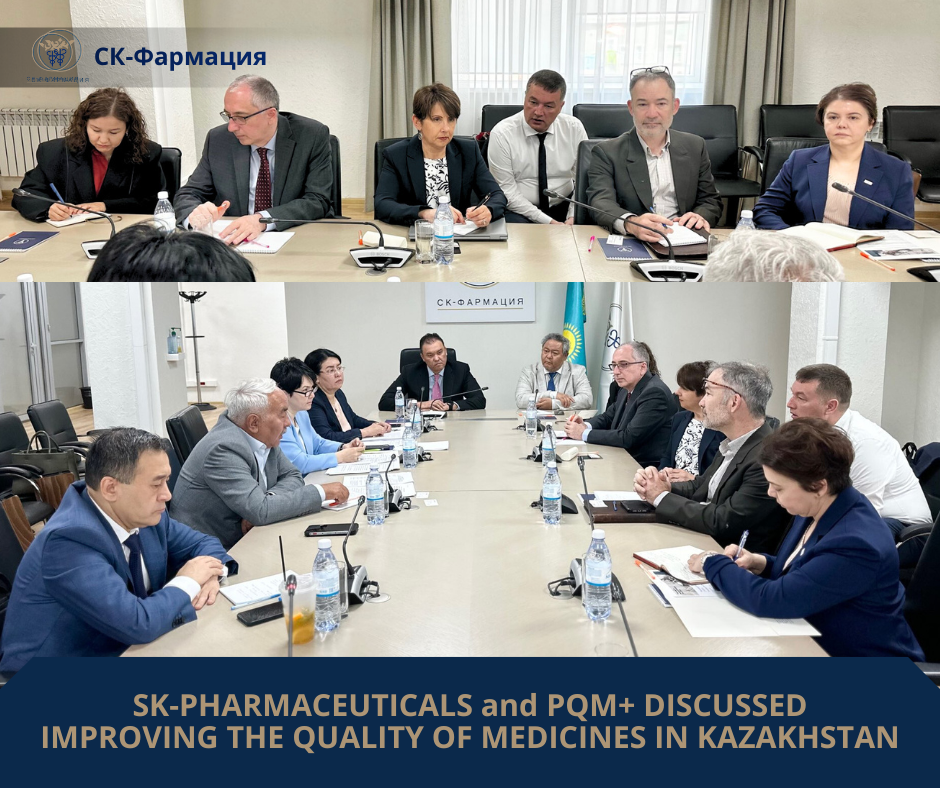
Today, at the site of the Unified Distributor, a meeting was held with the leaders of the Promoting the Quality of Medicines (PQM+) program of the United States Agency for International Development (USAID).
The meeting was attended by the Director, Office of Democracy and Health, USAID/Central Asia, Robin Marduz, as well as representatives of the implementing partner USP and subordinate organizations of the Ministry of Health of the Republic of Kazakhstan.
The Medicines Quality Advancement Program is a cooperative agreement between the United States Agency for International Development (USAID) and the United States Pharmacopoeial Convention (USP) to sustainably strengthen health care product quality systems.
At the meeting, key issues related to improving the quality and safety of medicines produced and supplied to the Kazakh market were discussed. The current state of the pharmaceutical industry in Kazakhstan was reviewed, as well as achievements, obstacles and directions of development in the pharmaceutical industry.
PQM representatives shared their experience and best practices in the field of drug quality assurance. They presented recommendations for improving the national quality control system, and also discussed the possibilities of introducing modern technologies and innovative solutions in production and control processes.
During the meeting, the guests were told in more detail about the centralized procurement system operating in Kazakhstan and the role of the Unified Distributor in the drug supply system. In addition, they were introduced to current projects, plans and prospects for cooperation with global industry players.
In particular, the work done to attract global players to the Kazakh market, create a pharmaceutical hub, conduct group purchases with neighboring countries, develop pharmaceutical clusters, cooperate with companies producing original drugs, raw materials for the production of medicines and medical devices was announced.
To improve the quality standards of drugs, the Unified Distributor put forward proposals to assist the American company Cardinal Health in conducting group purchases of medicines in Central Asia. At the same time, cooperation has been initiated to improve cold chain management and introduce best practices in the country.
Another initiative was the creation of an educational institution focused on the education and training of specialists in the field of pharmaceuticals and healthcare, in collaboration with leading universities and global industry players to exchange experiences and best practices.
The bilateral discussion made it possible to identify specific goals and objectives for in-depth cooperation between the Unified Distributor and the PQM+ Program. The head of the Unified Distributor, Erkhat Iskaliev, noted that cooperation with PQM is an important step towards improving the quality and availability of medicines for the population of Kazakhstan.
The parties emphasized the importance of international cooperation to ensure a high standard of quality of medical products. Representatives of PQM+ expressed their readiness to actively participate in programs aimed at improving the quality of medicines in Kazakhstan, and noted the country’s high potential in the field of pharmaceuticals.
At the end of the meeting, the parties agreed on further steps to implement the planned plans and confirmed their commitment to achieving common goals of providing the population of Kazakhstan with safe and high-quality medicines.
For reference:
The Medicines Quality Promotion (PQM+) program works to improve the quality of medical products through cross-sectoral and system strengthening approaches, as well as the application of international quality assurance standards throughout the pharmaceutical system - in regulatory authorities, quality control laboratories, manufacturing plants and beyond.
The United States Agency for International Development (USAID) is the highest federal government agency of the United States of America in the field of providing foreign assistance. The Agency Administrator and Deputy Administrator are appointed by the President with the consent of the Senate and act in coordination with the United States Secretary of State].
The United States Pharmacopoeial Convention (USP) is a nonprofit, non-governmental health care organization that develops documented standards and produces reference materials for prescription and over-the-counter drug products recognized by U.S. law. USP's mission is to improve healthcare throughout the world through government standards and related programs that help ensure the quality, safety and effectiveness of medicines and foods.